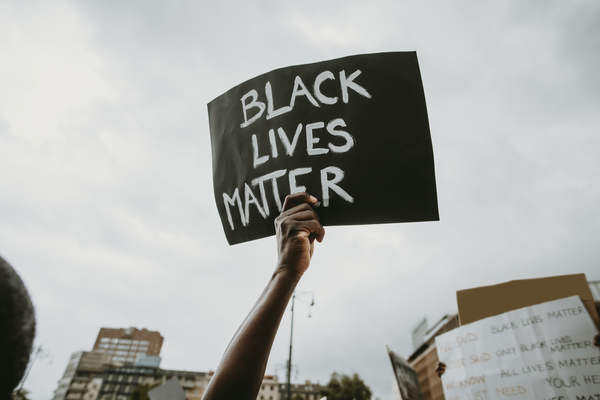“I’ve got so much trouble on my mind … ” These opening lyrics to the 1990 Public Enemy rap song “Welcome to the Terrordome” automatically flash in my head whenever the symptoms of racism flare up. In these open lines, rapper Chuck D is describing his state of mind as a Black man in America.
I’m a preacher, so perhaps you might think other songs would come to my mind — perhaps something more sacred, more holy. But to be a Black woman in America and be relatively conscious, to paraphrase James Baldwin, is to be in a state of constant rage. Sweet holy songs don’t readily come to me. Christmas songs do not come to me. As a Black woman who happens to serve at a church that experienced white rage this past weekend when a group of demonstrators ripped down our Black Lives Matter banner and set it on fire, I am angry. And I’m tired.
I’ve got so much trouble … This song has played way too many times in my mind over the years. Sadly, it is a part of the soundtrack of my life. In the years that I have served at Metropolitan African Methodist Episcopal Church in the nation’s capital, I have witnessed other faith communities’ pain at being targeted because of the color of their skin or their faith tradition. Whether Christian or Jewish or Muslim, these communities have been under attack by those who believe that their own faith dictates the annihilation of anything — and anybody — that does not share their ideology. I have supported and prayed for other faith communities who have had their pain and tears displayed throughout the media for all the world to see. I have cried with them, organized prayer vigils, and gone to protests. I’ve done it on others' behalf. But now it is my turn to be the faith community under attack — my turn to be in the fishbowl, for all to see.
Being on this side of the pain has almost been an out-of-body experience. What happened last weekend in the front of my church hit me to my core. At Metropolitan, we regularly wrestle with hard topics in sermons and Bible studies; we don’t shy away from the reality that the Earth is not as God would have it. We see the pain on the streets surrounding our beloved building. We feed the hungry, clothe the naked, and fight for those whose voices are being diminished by a government that has chosen to participate in their demise. We preach and teach about liberation, transformation, and reconciliation — what Rev. Dr. Jeremiah Wright called three prongs of the prophetic Black church tradition. We talk it, eat it, sleep it. Yet we still we find ourselves in the crosshairs of white supremacy.
The trouble isn't just in my mind; the trouble is real. We are constantly besieged by a tainted Christianity that has lost sight of who Jesus is and what Jesus’ ministry was about. This trouble is real because I know that there are people out there who do not believe that the lives of the many members of my congregation matter.
This trouble is so real and so painful it has followed generations of Black folks who have lived in America; our humanity overlooked, our beauty not seen, our intellect ignored, and our lives often cut short because of a construct that serves to keep white people in power over Black bodies. This trouble is our daily reality. It has unfortunately become imbedded in our DNA, manifesting itself in Black people’s lives medically, socially, financially, and theologically.
I am heartened by the outpouring that we at Metropolitan AME have received from all over the world. I am grateful that people, no matter their skin color or their faith tradition, are sharing our outrage after seeing the video footage in front of our church.
My prayer is that their outrage extends beyond the destruction of replaceable property. America has fetishized Black pain and suffering. Widespread outrage spreads when violence perpetuated against Black entities is caught on video, but when the cameras are off, people go back to their regularly scheduled program, ignoring the perpetual pain of living on the margins. It is my hope that this time, the cycle is broken, and that Black Lives Matter is bigger than a sign.
It would be easy for us to get lost in the despair and anger of being under constant siege. It would be easy to give up to the trauma and pain of being treated as subhuman. However, I believe that Chuck D gave us a glimpse of the resilience of Black people in America. “I’ve got so much trouble on my mind,” he says, then adds: “Refuse to lose.” Chuck D does not give the final say to the trouble.
Refuse to lose: The ancestral reality that empowers me to keep on keeping on will not allow me to succumb to despair. Metropolitan AME has changed my life. Even after earning my Master of Divinity at Payne Theological Seminary, an AME institution, I had to step into a space where Black luminaries — including Ida B. Wells-Barnett, Mary McLeod Bethune, Frederick Douglass, and Gwen Ifill — had once worshiped and spoke to begin transforming how I saw the world: I refuse to lose. I refuse to hand over my joy amid insecure white men ripping down signs that affirm my humanity.
At Metropolitan, we are continuing the work that has always been before us. We are not allowing weak attempts to quell our impetus to be, as my pastor William H. Lamar IV put it, “deeply spiritual and deeply engaged in the world.” Yes, there is so much trouble on my mind … but I do refuse to lose.
Got something to say about what you're reading? We value your feedback!







